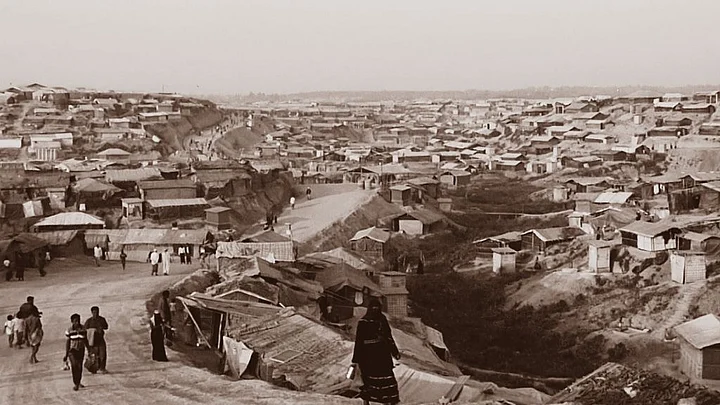A Rohingya refugee arrested last month in Assam has come under suspicion of making efforts to spread the network of a terrorist outfit in Myanmar.
Mohammad Aman Ullah’s past activities in India are being minutely screened for more information on the Arakan Rohingya Salvation Army (ARSA) and its functionaries, who might have taken refuge in the country.
ARSA, formerly known as Harakah al-Yakin, or ‘Faith Movement’, is currently active among the Rohingya residents in Myanmar and Bangladesh. It claims to be fighting for the rights of the Rohingya population in Myanmar, which were denied by the government.
Police were unaware that the development on 25 July, when nine Rohingya refugees were arrested at Gauhati Railway Station, including six women and a child, could lead them to a prized catch: Aman Ullah. He was not initially arrested as he had identified himself as a resident of Narwal in Jammu and Kashmir.
After the registration of a case and subsequent interrogation, stunning details were unearthed about the modus operandi of Aman Ullah, who was himself a Rohingya refugee deeply engaged in settling members of his community from Bangladesh in different parts of the country.
Several Twists
The development prompted the Special Branch of Assam Police and Railway Police to despatch a team to Narwal to verify the details given by Aman Ullah. Further investigation revealed that he was a resident of Hatharpara in Myanmar’s disturbed Rakhine state, which had witnessed killings and the forced eviction of more than 7 lakhs Rohingya in 2017 following “clearance operations” by the Tatmadaw (Myanmar military).
Since 2017, Aman Ullah had been shuttling between India and Bangladesh with the twin objectives of identifying safe spots for the refugees to settle and organising batches from the refugee camps in Bangladesh to sneak into India through secured routes along the border.
He disclosed that he had crossed the border from Myanmar to Bangladesh at Teknaf and proceeded to Jammu and Kashmir through the border in West Bengal. He returned after a few months to reach the refugee camp at Kutupalong in Bangladesh (near Teknaf), where he stayed for eight months. Subsequently, he set foot again in India through a different route via Tripura.
A Wide Network
“But it was not until the call data on his two mobile phones were analysed that we began to suspect his linkages with ARSA. Aman Ullah had carved out a big network in India in a brief span,” said an official engaged with the probe.
He explained that Aman Ullah was also able to procure an AADHAR card through his contacts that span several states such as Uttar Pradesh, Madhya Pradesh and Assam, besides Jammu and Kashmir.
In the long list retrieved from the call data were three Whatsapp groups where Aman Ullah was actively involved in spreading video footage of ARSA showing functionaries brandishing sophisticated weapons. Members of the investigating group concluded that these were filmed at villages in Myanmar’s Rakhine state, where the rebel group commands support among the Rohingya residents.
These WhatsApp groups were found to be flooded with footage displaying the atrocities by the Myanmar military on the Rohingya and radical audio messages exhorting the members of the community to engage in jihad. The members of these groups, who were mainly from Myanmar, Bangladesh and Pakistan, also welcomed the idea of implementing the Sharia law in a state that would be governed by the Rohingya themselves.
India's Porous Border
The investigation is still on, with a central security agency also stepping in to gather more details and assess the implication of the efforts being made by Aman Ullah to spread the network in the country.
The episode is a stark reminder of the gaps along the country’s borders that continue to facilitate infiltration.
Earlier this month, the government informed Parliament that the maximum number of attempts to enter the country illicitly had been from Bangladesh, among all the neighbouring countries.
However, it's important to remember that the United Nations has described Rohingya as “the most persecuted minority in the world” due to the systematic discrimination they face. A tide of displaced people are seeking refuge in neighbouring countries since 2017 as they fled Myanmar with horrifying claims of gang rape, torture and murder at the hands of Myanmar's security forces. Indian authorities must be careful not to use the case of Aman Ullah to further oppress an already persecuted minority.
Rohingya refugees have been apprehended on many occasions over the past few years and many among them are still lodged at detention centres. Some groups had been deported to Myanmar as well after they completed the sentences for illegally entering the country.
In April, the Supreme Court rejected a plea to stop the government from deporting some 150 Rohingya refugees to Myanmar. The petition prayed for the release of Rohingya men and women detained in Jammu and block the government from deporting them.
(Rajeev Bhattacharyya is a senior journalist in Guwahati. Views expressed are personal. This is an opinion piece, and the views expressed are the author’s own. The Quint neither endorses nor is responsible for them.)
(At The Quint, we question everything. Play an active role in shaping our journalism by becoming a member today.)
